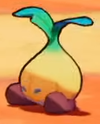Seedle: Difference between revisions
(→Names in other languages: They're named after Goombas. Or, as "named after Goombas" as Beanies are, at least.) |
|||
| Line 17: | Line 17: | ||
|Jap=ナエボー | |Jap=ナエボー | ||
|JapR=Naebō | |JapR=Naebō | ||
|JapM=Portmanteau of「苗」(''nae'', "seedling") | |JapM=Portmanteau of「苗」(''nae'', "seedling") and「マメボー」(''Kuribō'', "[[Goomba]]") | ||
|Chi=苗宝 | |Chi=苗宝 | ||
|ChiR=Miáobǎo | |ChiR=Miáobǎo | ||
|ChiM=From「苗」(''miáo'', "seedling") | |ChiM=From「苗」(''miáo'', "seedling") and「栗宝宝」(''Lì Bǎobao'', "Goomba") | ||
|Ita=Piantagrania | |Ita=Piantagrania | ||
|ItaM=From ''piantagrane'' ("troublemaker"; lit. "trouble-planter") and noun-deriving suffix "-ia" | |ItaM=From ''piantagrane'' ("troublemaker"; lit. "trouble-planter") and noun-deriving suffix "-ia" | ||
Revision as of 14:13, November 12, 2024
This article is about a subject in an upcoming or recently released game. When the game is released, or more information about this subject is found, this article may need major rewriting.
This notice should be removed after a month has passed since the game was first released.
| Seedle | |||
|---|---|---|---|

| |||
| First appearance | Mario & Luigi: Brothership (2024) | ||
| |||
| |||
Seedles are seed-like enemies that appear in Mario & Luigi: Brothership on Conductor Island and Rumbla Island. They are the weakest enemies in the game and the first ones Mario battles. Their name is a portmanteau of "seed" and "little". They have brown feet, yellow bodies, and a green sprout. Seedles, like most other enemies, wander on the field aimlessly, only attacking when Mario and Luigi get too close to them.
Battle
Seedles attack by simply running into the Mario Bros., which can be avoided by jumping.
Seedles also have a stronger variant called the Seedle R, which appears on Florall Island, and a water-possessing variant called the Hydro Seedle, which appears on both Florall Island and Liil Islet.
Names in other languages
| Language | Name | Meaning | Notes |
|---|---|---|---|
| Japanese | ナエボー[?] Naebō |
Portmanteau of「苗」(nae, "seedling") and「マメボー」(Kuribō, "Goomba") | |
| Chinese | 苗宝[?] Miáobǎo |
From「苗」(miáo, "seedling") and「栗宝宝」(Lì Bǎobao, "Goomba") | |
| Italian | Piantagrania[?] | From piantagrane ("troublemaker"; lit. "trouble-planter") and noun-deriving suffix "-ia" | |
| Spanish (NOE) | Milla[1] | Clipping of semilla ("seed") |